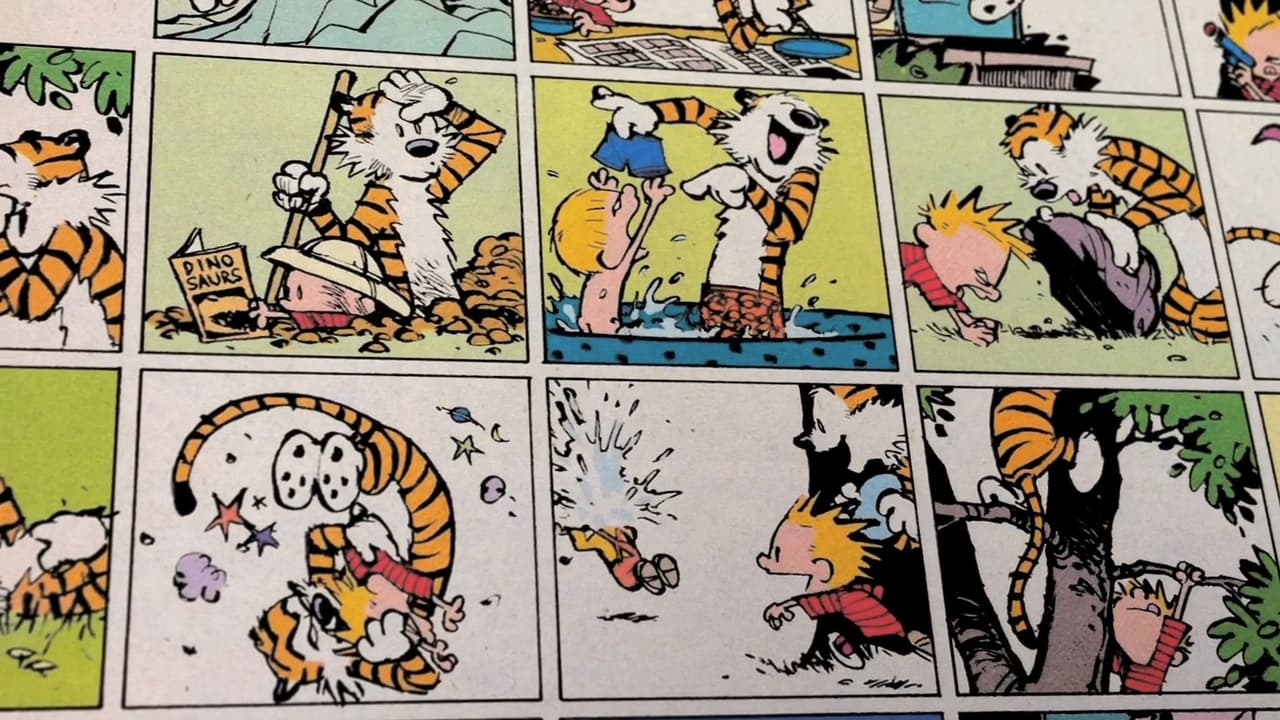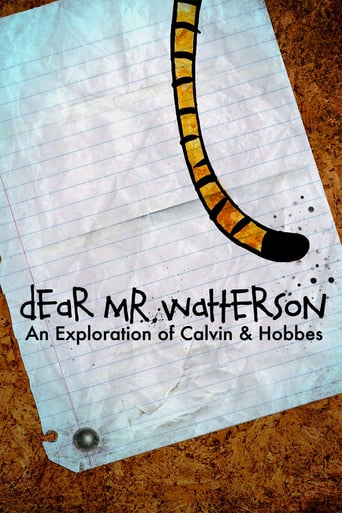

Charming and brutal
... View MoreAwesome Movie
... View MoreIt's fun, it's light, [but] it has a hard time when its tries to get heavy.
... View MoreYes, absolutely, there is fun to be had, as well as many, many things to go boom, all amid an atmospheric urban jungle.
... View MoreThis new trend in documentaries is very annoying.Here is the formula about the person making the doc. They are not famous, they really liked or geeked out over something and now want to talk to like minded people and gush over the past and how something that was very good like "Calvin and Hobbes" made them feel and you really don't find out anything about the person or people involved in the thing they love. It is about a bunch of nobody fan boys.Also refer to "Done the Impossible" for a another piece of garbage in this genre.Mr. Watterson created a great comic strip years ago and is a very private person from what I have read. I would have liked to know more about him and less about the people who liked his comic strip.
... View MoreI love Calvin & Hobbes as much as anyone. Unfortunately, this documentary is just a narcissistic exercise for the narrator, who wants you to watch him reading Calvin & Hobbes comics. And, in true Hipster fashion, his "favorite C&H comic" is one that "nobody else" talks about - only he can "realize" it's genius. The only interesting parts are the interviews with other popular comic strip writers who respect Bill Watterson and give some insight on his work, which is truly only Berke Breathed. (And curiously absent is Gary Larsen and Garry Trudeau, his only real peers, besides Breathed.) There was no discussion about any attempt to interview Watterson for the documentary or why he declined, and very little exploration into his life. He grew up outside of Cleveland - that's it; that's all you'll get from the film. Much worse, there is no exploration, much less mention of, Watterson's misguided take on the internet given in interviews during its early days that is laughable in today's context, especially when you consider what people do with their old newspapers. It's as if the filmmaker knew very little about Watterson when he complains that newspapers weren't giving due respect to Watterson's work, when newspapers were Watterson's preferred method of publishing.What you will see is half of the film showing the narrator/director with his douchey, fresh-out-of-the-make-up-chair haircut in close-up head- shots pouring over comics like he just discovered the Dead Sea Scrolls. This documentary could have been so much better. I only hope the interviewees will sacrifice their time again when somebody with talent makes a serious effort in documenting what could be a fascinating subject.
... View MoreI'm going to start this review by saying I am far from being the biggest "Calvin and Hobbes" fan in the world. Among comic strips, "Peanuts" is my first love. However, I do have a deep appreciation for the "Peanuts- esque" quality that is present in "Calvin and Hobbes", where the child sees the world through a unique lens that is evident there is wisdom beyond his years. Even the main character, a male child with a distinctive striped shirt, is a flattering nod that I can appreciate.So, I watched this documentary more from the perspective that I am an outsider looking in, wanting to know what motivated the characters in the strip and the artist behind the characters. Sadly, I did not get much, if any, of these. In fact, I didn't learn anything that I didn't already know from even a cursory reading of the comics. It seems to me a documentary exploring the impact of a comic strip on the would have been better served by an exploration of the creator, Bill Watterson, and how the characters came about and what they say about him.I understand that Watterson is very difficult to reach, and keeps mostly to himself. However, even from the perspective of someone who isn't a superfan, I think it's disingenuous to simply regurgitate what's already known. Besides, the filmmaker titled his documentary as an address to "Mr. Watterson." Seems to me that the documentary should have made the attempt to explore his story more.One last thing I wish to mention, and that is the issue of licensing involved with the comic strip characters. Charles "Sparky" Schulz, the creator of "Peanuts", may have been just as difficult to really get to know and understand as Bill Watterson is, and it's evident by what is known about both men that the comics and characters they created were deeply personal to them, and each man wanted to protect their characters. However, Schulz still allowed his characters to be licensed, whereas Watterson famously does not. I don't know if this was the intention of the filmmaker, but it seemed like there was an unfair, and unjust, portrayal that "Sparky" sold out, and that Watterson stands on higher ground. I like how Schulz's wife Jean gave a little bit of insight into why her husband made the decision he did to license the characters, but still it seemed as though it was a shot at Charles Schulz's own legacy in order to build up Watterson's, and I am not convinced that Watterson would go so far as to criticize Schulz for doing that, especially considering the impact "Peanuts" had on "Calvin and Hobbes."
... View MoreThe documentary was a great delve into the world of Calvin and Hobbes. It's not just a fan flick about how great Calvin and Hobbes is, it also covers a lot of the behind the scene decisions made by Mr. Watterson. Things like refusing to do merchandising, were really fascinating.Looking at how Calvin and Hobbes has transcended the times, and continues to be a hit with the newer market. That's just as interesting, as it's influence on other artists. Watching the interviews of other cartoonists were equally as interesting. The explanation of the whole syndication process, and everything that goes with it, I think might explain why Mr. Watterson left when he did.All in all, I think the documentary was well put together. It had a personal aspect, it had a widespread aspect. It did a good job of wrapping everything together, to show the influences on both the creation, and ending of Calvin and Hobbes.
... View More